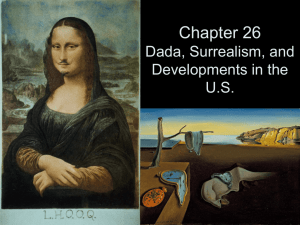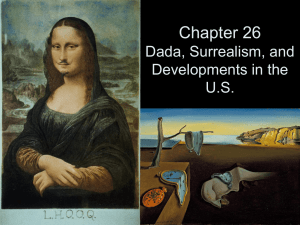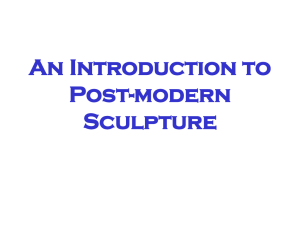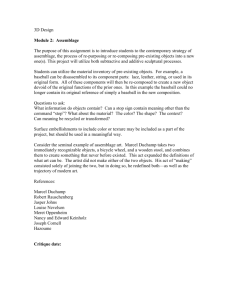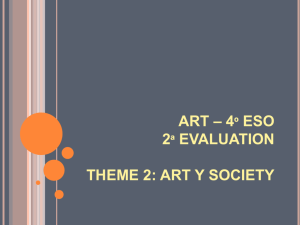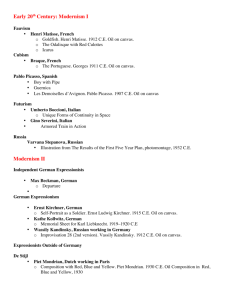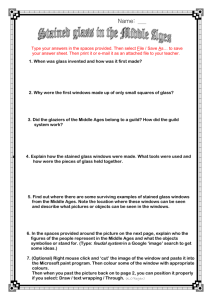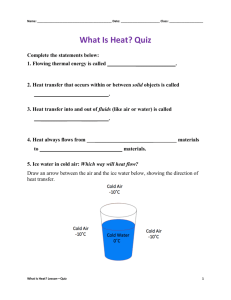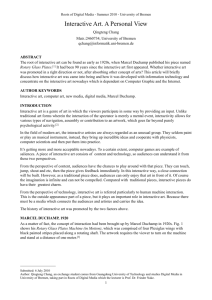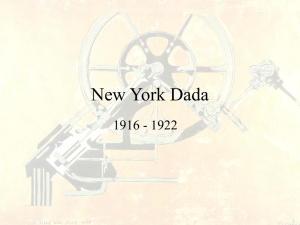Kinetic Art History
advertisement
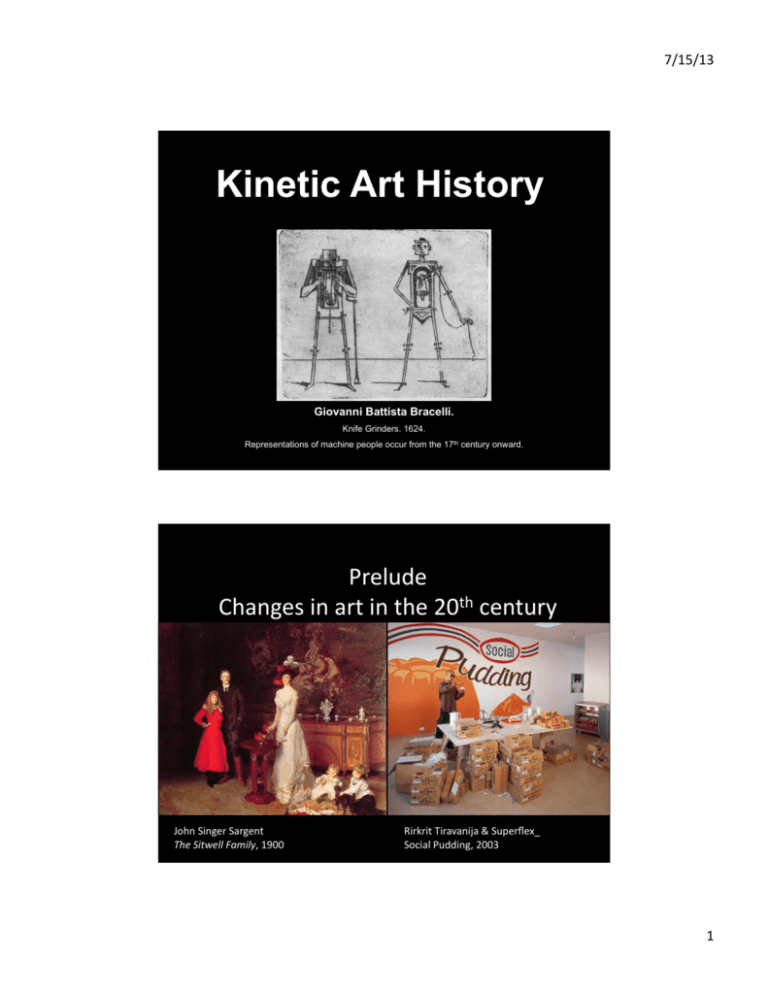
7/15/13 Kinetic Art History Giovanni Battista Bracelli. Knife Grinders. 1624. Representations of machine people occur from the 17th century onward. Prelude Changes in art in the 20th century John Singer Sargent The Sitwell Family, 1900 Rirkrit Tiravanija & Superflex_ Social Pudding, 2003 1 7/15/13 Impressionism A reacKon against the canned academic styles, painKng from real life, outside, not staged scenes. Auguste Renoir Le Moulin de la GaleQe 1876. Vincent Van Gogh The Night Café 1888 Gabon Mahongwe mask Wood and pigments Cubism Pablo Picasso Les Demoiselles d’Avignon 1907 Oil on canvas 96 x 92” 2 7/15/13 Futurism Umberto Boccioni The City Rises 1910 Oil on canvas Giacomo Balla Dynamism of a Dog on a Leash 1912 Oil on Canvas EKenne Jules Marey And Charles Fremont Hicng Directly 1894 GelaKn silver print Marcel Duchamp The Bride Stripped Bare by Her Bachelors, Even (the Large Glass) Original 1915-­‐1923; replica by Marcel Duchamp and Ulf Linde, 1961 Oil, lead, lead wire, foil, dust, and varnish on glass, 9'3" x 6'7/8" Moderna Museet, Stockholm Aker his iniKal researches, begun in 1912, Duchamp worked on the Large Glass itself for nine years, from shortly aker his arrival in America in 1915 unKl he abandoned it, unfinished, in 1923. It is probably the largest single project in modern art and may also be the most important. 3 7/15/13 DAVID SMITH Cubi XIX Steel 1964 David Smith Tanktotem II 1952-­‐1953 Steel and Bronze Robert Rauschenberg Odalisk 1955-­‐8 Oil, watercolor, pencil, fabric, paper, photographs, metal, glass, electric light fixtures, dried grass, steel wool, neckKe, on wood structure with four wheels, plus pillow and stuffed rooster. Jackson Pollock Lavender Mist Number I 1950 Oil, Enamel, and Aluminum paint on canvas 86 ½” x 119” 4 7/15/13 Pop Art Claes Oldenberg Sok Toilet 1966. Vinyl, Plexiglas, and kapok 55" high x 28" wide x 33" deep. Andy Warhol 200 Campbell’s Soup Cans 1962 Oil on canvas 72 x 100” Claes Oldenberg Two Cheeseburgers with everything (Dual Hamburgers) 1962. Burlap soaked in plaster, painted with enamel 7 x 14 ¾” x 8 ½” Conceptual Art Joseph Kosuth One and Three Hammers (English Version) 1965 Hammer, photograph of a hammer, photostat of the definiKon of hammer 24 x 53 3/8” 5 7/15/13 Robert Irwin Un*tled.1965-­‐67 Sprayed acrylic lacquer on shaped aluminum 60 inches diameter Minimalism Donald Judd UnKtled (Yellow) 1974 Anodized Aluminum 6 7/15/13 Automata and Androides Jacques de Vaucanson’s mechanical duck. Created in 1738, the duck was built to tour and perform to raise funds so that Vaucanson could work on creating artificial mechanical life. The copper duck quaked, bathed, drank water, ate grain, digested it, and produced droppings. Last seen at a Milan opera house in 1844, the duck current whereabouts, if indeed it still exists, remain a mystery. These devices were great attraction in the 18th century, spectators came to see a perfect reproduction of life. It is interesting to note that although the spectators knew that these were mechanical devices, the mechanics were carefully hidden. Vaucanson’s Automata 1738. The drummer, flute player, and duck. The Capturing and abstraction of the body in motion Etienne-Jules Marey. A scientist who did motion studies of human and animal subjects. His work was adopted by Taylor for studying the movements of workers to improve efficiency. Taylorism, as loved by workers as the Jacquard loom. Marey’s Camera gun. the First motion picture camera. Below is the trace made by a bird while it is flying. 7 7/15/13 Marcel Duchamp Nude Descending a Staircase, No. 4. 1917 Etienne Jules Marey and Charles Fremont Hitting Directly 1894 Gelatin silver print Naum Gabo Kinetic Sculpture (standing wave). 1920. Metal rod with electric motor, 24.25 x 9.5 x 7.5”. 8 7/15/13 Marcel Duchamp Rotary Glass Plate (Precision Optics). 1920 Motorized construction: painted glass and metal, 3'1 1'/2" high X 3'4" wide x 6"/2" deep 9 7/15/13 Alexander Calder Red Petals Mobile made of metal Rebecca Horn Les Amants 1991 Two glass funnels, black ink, champagne, and motor, dimensions variable 10 7/15/13 Roxy Paine Scumak is a computer-programmed machine that produces small, amorphous sculptures by extruding polyethylene at various speeds and frequencies. It is a depiction of a future in which machines would be able to mass-produce "unique" artworks, conveniently replacing artists. SCUMAK (Auto Sculpture Maker). 1998. Automated sculpture-making device. Private collection. stainless steel, polyethyline, extruder, cooling system, teflon, and electronics 84 x 163 x 52 inches. TOP LEFT preliminary sketch TOP RIGHT AND BOTTOM, installation views 11 7/15/13 Angela Bulloch Betaville 1994. Sabrina Raaf Translator II: Grower 2004-­‐2006 12
